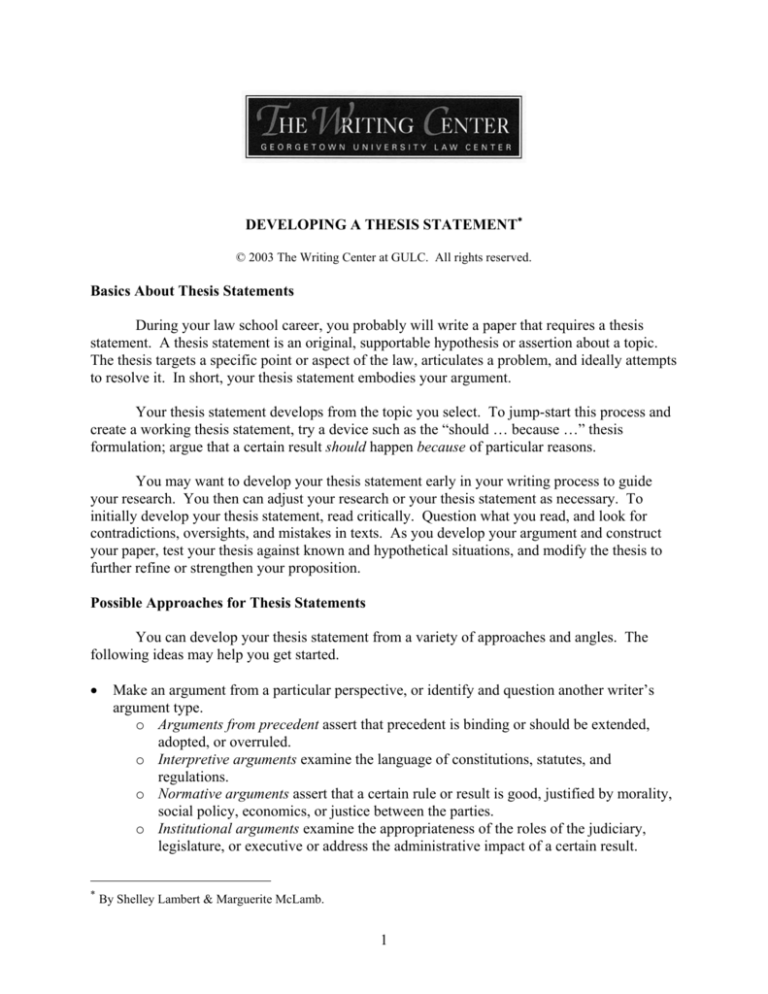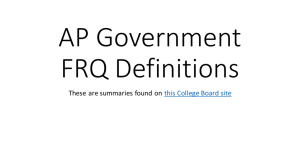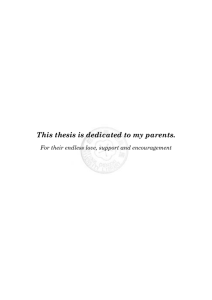
DEVELOPING A THESIS STATEMENT∗
© 2003 The Writing Center at GULC. All rights reserved.
Basics About Thesis Statements
During your law school career, you probably will write a paper that requires a thesis
statement. A thesis statement is an original, supportable hypothesis or assertion about a topic.
The thesis targets a specific point or aspect of the law, articulates a problem, and ideally attempts
to resolve it. In short, your thesis statement embodies your argument.
Your thesis statement develops from the topic you select. To jump-start this process and
create a working thesis statement, try a device such as the “should … because …” thesis
formulation; argue that a certain result should happen because of particular reasons.
You may want to develop your thesis statement early in your writing process to guide
your research. You then can adjust your research or your thesis statement as necessary. To
initially develop your thesis statement, read critically. Question what you read, and look for
contradictions, oversights, and mistakes in texts. As you develop your argument and construct
your paper, test your thesis against known and hypothetical situations, and modify the thesis to
further refine or strengthen your proposition.
Possible Approaches for Thesis Statements
You can develop your thesis statement from a variety of approaches and angles. The
following ideas may help you get started.
•
∗
Make an argument from a particular perspective, or identify and question another writer’s
argument type.
o Arguments from precedent assert that precedent is binding or should be extended,
adopted, or overruled.
o Interpretive arguments examine the language of constitutions, statutes, and
regulations.
o Normative arguments assert that a certain rule or result is good, justified by morality,
social policy, economics, or justice between the parties.
o Institutional arguments examine the appropriateness of the roles of the judiciary,
legislature, or executive or address the administrative impact of a certain result.
By Shelley Lambert & Marguerite McLamb.
1
•
Identify and resolve inconsistencies, logical errors, and omissions.
o Examine issues the writer omits, logical fallacies, false dichotomies, unsupported
empirical claims, claims not supported by cited authorities, or a court’s unstated
reasons for a decision.
•
Identify and question jurisprudential approaches.
o Examine the approach a judge takes in a decision, and imagine the outcome from
another perspective. Common American jurisprudential approaches include
Formalism, Legal Realism, Legal Process, Fundamental Rights, Law and Economics,
Critical Legal Studies, and Feminism.
•
Probe the context of a decision, law, or issue.
o Examine the relation of a statutory provision to the larger document.
o Consider predecessor statutes or legislative history.
o Look at lower court decisions that reveal material that may have been simplified or
omitted.
o Examine a decision’s place in a larger social or historical context.
o Compare a case to cases in analogous subject areas.
o Consider the ramifications and consequences of a decision.
o Consider interdisciplinary comparisons.
•
Try problem-solving.
o Place yourself in the position of the parties and imagine alternative arguments and
outcomes.
Based upon Elizabeth Fajans & Mary R. Falk, Scholarly Writing for Law Students: Seminar Papers, Law Review
Notes, and Law Review Competition Papers 27-50 (2d ed. 2000).
2
Sample Thesis Statements
•
Specifically, this paper argues that law school legal writing courses should include
instruction on statutory drafting because most law school graduates will need to know
either how to draft statutes or the skills used in statutory drafting, and thus, statutory
drafting is a necessary skill for all lawyers.
•
The widespread support of the Act by an overwhelming majority in Congress and by the
public indicates that personal interests of lawmakers did not prevail over policy
considerations that advance the public will while promoting the public good.
•
This paper will demonstrate that streamlining sales tax regimes across the United States
will have virtually no effect on consumers and will capture an untapped tax base for
states.
•
A broader, more robust notion of legal pedagogy would permit more opportunities for
students to read actively and to respond in speech and in writing, tasks that are
fundamental to professional lawyering. An approach that integrates these skills would
transform legal education from training individuals to “think like lawyers” to creating
individuals who use their full developmental capacities to generate legal thought.
•
Every day in the Writing Center, Senior Writing Fellows exercise skills necessary for
successful negotiations. Deliberate and conscious promotion of those skills can make the
Fellows better in their tasks at the Writing Center and in negotiations in other contexts,
while transforming the Center’s clients into more collaborative, creative, and empowered
legal writers and legal community members.
•
This paper suggests that you take your natural abilities even further. Don’t save your
innate expressivist abilities for emergency situations. You should use expressivist
techniques, like freewriting or journal writing, even when you have weeks or days to
write your brief, memo, or opening statement.
•
Novice legal writers who become re-seers by incorporating resolving, reconceiving, and
revisiting into their revision process will become more effective and efficient writers.
•
This paper proposes that legal writing has not improved in part because the current
approach to teaching legal writing prevents students from learning how to become better
legal writers.
•
The democratization of Taiwan has forced the [Nationalist Party and the Chinese
Communist Party] to leave the zero-sum game of dominance in order to explore other
options that meet the interests of all involved parties.
3
•
If courts are to consider the propriety of class counsel’s conduct in the class certification
process, then generally accepted standards for evaluation of that conduct are essential to
both the judicial process and counsel who undertake class representation.1
•
[This article] suggests that the private incentives to litigate may often be inadequate in
terms of their social benefits.2
•
[Fee awards to plaintiffs’ attorneys in class actions] are a serious problem which will only
add to the disrepute of the legal profession if the profession does not engage in some
serious self-analysis.3
•
The ethics rules are inadequate to handle conflicts that arise in public interest practice.4
•
This paper examines how poor information handling by the federal government
contributed to the chemical contamination and cleanup problems in Spring Valley and
how better communication within and between federal agencies, with local governments,
and with the public could have produced results more quickly and with less animosity.5
Note: Statements without cites are from unpublished, student works.
1
Brian J. Waid, Ethical Problems of the Class Action Practitioner: Continued Neglect by the Drafters of the
Proposed Model Rules of Professional Conduct, 27 LOY. L. REV. 1047 (1981).
2
John C. Coffee, Understanding the Plaintiff’s Attorney: The Implications of Economic Theory for Private
Enforcement of Law Through Class and Derivative Action, 86 COLUM. L. REV. 669 (1986).
3
David M. Young, Plaintiffs’ Attorneys’ Fees in Class Action Litigation: An Ethical Solution?, 2 J. INST. STUD.
LEGAL ETHICS 255 (1999).
4
Nicole T. Chapin, Note, Regulation of Public Interest Law Firms by the IRS and the Bar: Making It Hard To Serve
the Public Good, 7 GEO. J. LEGAL ETHICS 437 (1993).
5
Marguerite E. McLamb, Note, From Death Valley to Spring Valley: A Case Study of Contamination in
Washington, D.C., 3 SUSTAINABLE DEV. L. & POL’Y 3 (2003).
4







